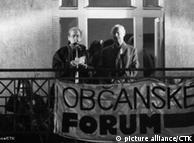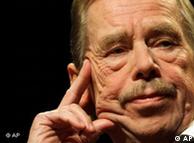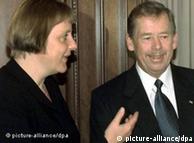EASTERN EUROPE | 18.12.2011
Former Czech president and anti-communist hero Vaclav Havel dies
Former Czech President Vaclav Havel died on Sunday morning at his weekend house in the northern Czech Republic, according to his assistant Sabina Dancecova. The 75-year-old had long battled poor health, partly caused by the time he spent in communist jails and years of chain smoking.
The dissident playwright wove theater into politics and became a hero in the movement that toppled the 41-year communist rule of Czechoslovakia in late 1989 before becoming the country's first post-communist president.
Havel was born in Prague in 1936 to a family that owned film studios and prime real estate in the city. After the communists took control after World War II, Havel was labeled a bourgeois capitalist and banned from studying. Despite this setback, he would work his way up in the theater world to become a writer and director.
 Havel (left) came to personify the revolution against the communist government in Czechoslovakia
Havel (left) came to personify the revolution against the communist government in CzechoslovakiaWhen the regime cracked down on the Prague Spring in 1968 he was also banned from the theater but continued writing and became more involved in the dissident movement. His political activism began in earnest in January 1977 when he helped draw up Charter 77, a manifesto calling on the communist authorities to live up to the international commitments they had made on human rights.
When the wave of revolutions sweeping across central and eastern Europe in 1989 reached Czechoslovakia, Havel was, as he put it, "catapulted" into the presidency overnight, just months after being released from jail. On December 29, 1989 he was elected Czechoslovakia's president by the country's still-communist parliament.
As president of Czechoslovia and then, after the country's peaceful division into the Czech Republic and Slovakia in 1993, as president of the Czech Republic, Havel would guide the country through democratic and economic transition. He presided over the Czech Republic's entry into NATO in 1999 and was largely credited with laying the groundwork for the country's accession into the European Union in 2004.
'Symbol of 1989'
Czech Prime Minister Petr Nacas called him a "symbol of 1989" and said Havel did a "great job for this country."
In Poland, former president and founder of the Solidarity movement Lech Walesa called Havel "a great fighter for the freeddom of nations and for democracy."
German Foreign Minister Guido Westerwelle honored him as "a great champion for democracy and freedom," and "the soul of the Czech revolution."
"Without him and his courageous words, the democratic awakening in Central and Eastern Europe would have been unthinkable," Westerwelle said.
German Chancellor Angela Merkel called him "a great European," adding that "we Germans in particular have much to thank him for."
Former chancellor Helmut Kohl, who was in office during the political changes in 1989 and 1990, said Havel was "a great man without whom freedom would have been unthinkable."
A busy retirement
After serving the maximum two consecutive terms in office, Havel left the presidency in 2003. He devoted his time to fighting for human rights internationally, supporting Cuban and Chinese dissidents, the democratic opposition in Belarus, the fight against the military junta in Myanmar and Vladimir Putin's tenacious grip on power in Russia.
"The post-presidential life resembles the life of a president," he said, "But it's harder because you can be president for several years, but you are an ex-president until you die. Which brings numerous obligations."
Havel also continued to work in the arts. He published a new play, "Leaving," about the struggles of a leader on his way out of office in 2008 and also directed the film version, which debuted earlier this year.
Author: Holly Fox (AFP, AP, Reuters)
Editor: Nicole Goebel
Editor: Nicole Goebel



ηγετική φυσιογνωμία μεγάλου ανδρός.
ReplyDelete